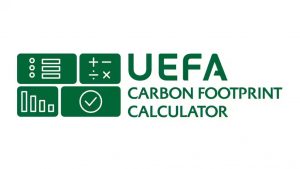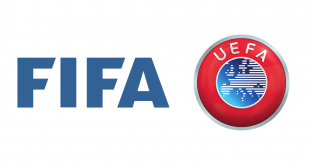 Tailored to national associations, leagues and clubs, UEFA’s innovative Carbon Footprint Calculator is a landmark in European football’s commitment to environmental sustainability.
Tailored to national associations, leagues and clubs, UEFA’s innovative Carbon Footprint Calculator is a landmark in European football’s commitment to environmental sustainability.
In a special launch event attended by around 180 guests, UEFA launched its Carbon Footprint Calculator at the Emirates Stadium in London on March 6th. The calculator is an online tool to help football stakeholders calculate, understand, and reduce their football-related emissions. This includes the areas of mobility, facilities, purchased goods and services, and logistics.
Moderated by Sky Sports presenter David Garrido, the event began with opening remarks from Laura McAllister, UEFA vice-president and executive committee member, and the English FA’s Paul Elliott, a member of UEFA’s social and environmental sustainability committee.
Laura McAllister, UEFA vice-president and executive committee member, said, “This is a very important moment in our on-going collaborations on this critical area,” said McAllister, referencing how the calculator aligns with the “strong and integral” focus on social and environmental sustainability in the UEFA Strategic Vision 2024-2030. “If we are to be successful, then all of this work has to be a collaboration and a willing partnership,” she added.
Elliot extended this sentiment by referencing biographer Helen Keller and calling on the influential attendees in the room to work together. “T-E-A-M, together everyone achieves more, that’s the way forward,” he said.
Collaborative process
Filippo Veglio, UEFA head of social and environmental sustainability, and Vincent Reulet, environment expert at UEFA, then provided an overview of the calculator, which is the result of a collaborative effort spanning two years and involving two dozen football organisations.
It is based on the Greenhouse Gas Protocol (GHG), which UEFA adapted into the Carbon Footprint Calculator for football stakeholders. Attendees were shown a short demonstration of how Arsenal FC – one of the pilot project’s participants – inputs data to the calculator, although Reulet warned that “it is not a magic box and the system will not do the work for you.” More detail was provided on how to use the calculator in an afternoon workshop for national associations, clubs, leagues, and football representatives.
Following this, a panel discussion about the calculator, as well as the state of sustainability and climate action in European football, was held with:
- Michael Lloyd – environmental sustainability manager, Arsenal FC
- Thomas Seillé – head of project and CSR coordinator, French Football Federation
- Lindita Xhaferi-Salihu – Sports for Climate Action lead at U.N. Climate Change, UNFCCC
- Matouš Michněvič – vice president, ESG lead for Europe, Mastercard
Caglio remarked that the integrity of the calculator is “fundamental” to avoid greenwashing, highlighting that in addition to GHG protocol, the calculator is aligned with ISO standards and is adaptable to football organisations at different stages of their sustainability journey. Both Caglio and Michněvič proposed using the calculator to gamify sustainability in football, generating “healthy competition with peers to activate behaviours,” said Caglio.
“We have to be pedagogical about what we are doing,” declared Seillé in a spirit of collaboration, suggesting that elaborating on reduction strategies is important so that stakeholders can help each other. Lloyd detailed how Arsenal helped shape the calculator, as well as how they interact with other Premier League clubs on issues like fan travel and waste.
Both in terms of spurring collaboration and its reach, “the power of football is indisputable,” asserted Xhaferi-Salihu, while reiterating that sustainability is no longer a moral issue but an “economic imperative.”
But even though this imperative exists, it doesn’t mean that sustainable football is easy. Seillé suggested that data collection at the amateur level is a tremendous challenge. He explained that people working or volunteering for amateur clubs tend to care about the environment but may not be familiar with terms like carbon footprint and greenhouse gas emissions.
Measuring success
In his closing remarks, Michele Uva, UEFA’s director of social and environmental sustainability, declared,
“Having concluded the development phase, we are now going to shift our focus to the most fascinating phase, the implementation and dissemination.” Uva underscored that the goal is to get the Calculator used not only by top division clubs but also grassroots clubs, combining a top-down with a bottom-up approach. “When the two streams succeed in integrating, we will have achieved what we have set ourselves as objective since the beginning of our work: to leverage the football platform as a means to play an active part in tackling the climate challenge.”
Thanking everyone involved in the extensive process since the beginning of the project and the football stakeholders involved in testing the calculator over the last eight months, Uva encouraged all the stakeholders to keep working closely together and fostering the mutual learning process which will be crucial in the following steps of this journey.
The UEFA Carbon Footprint Calculator is available to all football stakeholders and can be accessed under www.uefa.com/carboncalculator .
 Arunava about Football A look at football & the world through my eyes!
Arunava about Football A look at football & the world through my eyes!



